IBAP - Equipping Centre Leaders For Curriculum Innovation

To create quality learning experiences for children, ECDA Fellow and Principal of Living Sanctuary Kindergarten, Ms Elsie Tan-Chua, encourages centre leaders to incorporate curriculum innovation through her Inquiry-Based Action Plan (IBAP) project.

Mrs Elsie Tan-Chua, ECDA Fellow and Principal of Living Sanctuary Kindergarten, has a bit of a reputation in the early childhood sector as an innovation champion. Together with her staff, she is in continuous pursuit of innovative ideas to introduce into her centre’s curriculum.
“(At Living Sanctuary Kindergarten,) every two years or so, we try to introduce a new programme that we assess can enhance our curriculum. The new programme would be planned based on basic criteria such as how it would heighten children’s interest in learning – what new skills and knowledge the children could acquire, whether the programme would benefit other stakeholders such as parents and teachers, and how teachers can be well-prepared to implement the new programme with confidence,” she elaborated.

Indeed, her kindergarten has embarked on several innovative programmes such as the Problem-Solving Initiative (PSI) and the Healthy Lifestyle Ambassadors (HLA). PSI taught the children how to be confident problem solvers, brainstorm for solutions and select the best ones for implementation. The positive benefits to the children were also observed by parents. “Parents have given feedback that their children have made problem-solving part and parcel of life,” shared Elsie.
HLA on the other hand, equipped children from N2 to K2 with skills and knowledge to be healthy lifestyle ambassadors at home. The HLA programme is currently in the early stages of implementation at Living Sanctuary Kindergarten. Through the programme, children learn facts on healthy eating through game and healthy habits like regular exercise. As a bonus, they also learn to use equipment for health measurement such as weighing machines and blood pressure monitors.
“The (HLA) programme is staged in carefully. Teachers build in lessons to ensure that the children learn facts and build habits in an enjoyable way. The children are as excited as the teachers about the new initiative!” Elsie added.
CURRICULUM INNOVATION THROUGH IBAP
Having experienced how curriculum innovation has transformed her own centre, Elsie was strongly motivated to extend curriculum innovation to benefit the entire early childhood sector.
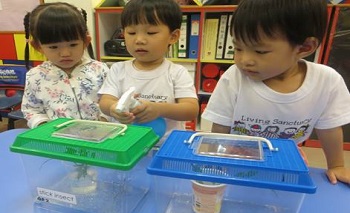
“As I watch my pupils and teachers gain from the curriculum innovation and the implementation process, I feel that other centres should try to introduce curriculum innovation as well. I hoped to share my experience and motivate them to give it a try,” Elsie explained.
Elsie also acknowledged the important role that centre leaders play in shifting the paradigm, “Leaders need to recognise that teachers are important in the process of curriculum innovation. Teachers need to know the objectives and buy in to them. The leader also needs to lead and equip each teacher with the skills to support the programme. The leader’s personal involvement can also demonstrate to the staff, the leader’s conviction to the programme.”
With strong objectives and clear outcomes in mind, Elsie embarked on her Inquiry-Based Action Plan (IBAP) project, “Equipping centre leaders for curriculum innovation”. IBAP Projects are conducted by ECDA fellows to guide and equip centre leaders with knowledge and skills in specific early childhood areas.
The anchor behind Elsie’s IBAP project is the Osborn Parnes Creative Problem-Solving (CPS) method. CPS serves as a guide to help individuals approach problems in innovative ways through a culture of open sharing. Through the CPS method, early childhood educators and children can embrace challenges and work together to brainstorm and implement creative ideas. The process involves exploring challenges, generating ideas through discussion and preparing for action.

Participants are also brought on learning journeys to experience the curriculum innovations implemented at various preschools. “Participants are brought to Living Sanctuary Kindergarten to find out more about our curriculum innovations. I also took them to other centres that have embarked on the Innovation Journey successfully after IBAP,” Elsie shared.
CURRICULUM INNOVATION IN THE PRESCHOOLS
Ms Ruth Chong and Ms Karen Teng, principals of PCF Sparkletots @ Bishan North Blk 257 and Bethel Day Care Centre respectively, both came on board Elsie’s IBAP project to find ways of encouraging their educators to be creative and innovative in their teaching methods.

“Elsie was generous in sharing her experiences. She was also encouraging and would give suggestions on how to improve my plans which I shared with her pertaining to space and limited resources. I felt empowered and enjoyed working with her.” Ruth shared.

Karen added, “I have seen how Elsie brought her team together, and used recycled, inexpensive materials to create meaningful contexts for the children to explore and learn in. We were encouraged by how her teachers could work together to bring forth meaningful and interesting activities for their children.”
Inspired by the IBAP workshops, both Bethel Day Care Centre and PCF Sparkletots @ Bishan North Blk 257 proceeded to implement innovative ideas into the children’s curriculum. Bethel Day Care Centre set up a mini-mart in their centre, stocked with a variety of “groceries” made from recycled materials. The mini-mart tied in with their curriculum theme on “food” and encouraged children to pick up healthy eating habits in a fun way.
The Mini-Mart at Bethel Day Care Centre


 |  |
For PCF Sparkletots @Bishan North Blk 257, innovation was infused in the many learning corners set-up for the children’s learning. Led by the theme “Supporting Diversity in my Community”, Ruth and her educators not only established a dress-up corner full of ethnic costumes contributed by parents, she also set up a café-themed dramatic play corner. The café was stocked with mock-ups of ethnic foods and even had a corner for children to “design cakes” using play dough. Over at the numeracy learning corner, Ruth’s educators used recycled materials to create learning resources for the children to practise math concepts. Learning materials were changed every 3 weeks to provide the children with variety.
Dress-up Corner and Dramatic Play Corner at PCF Sparkletots @ Bishan North 257
 |  |
 | 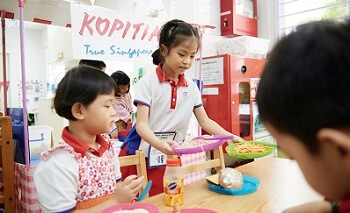 |
 |  |
“It aroused their curiosity and sparked an interest in them to want to explore and learn more. They developed a capacity for creative thinking and were finding innovative solutions to some of their questions,” added Ruth.
The children were not the only stakeholders who benefited from incorporating curriculum innovation in the preschools. Ruth observed that since starting curriculum innovation at her centre, her early childhood educators learned the importance of teamwork, timeliness, effective communication with parents and community engagements. “(Curriculum innovation helps to) foster an environment where teachers are able to share their ideas and work together,” she shared.
THE ROLE OF CENTRE LEADERS IN CURRICULUM INNOVATION
On the centre leaders who have journeyed with her through curriculum innovation, Elsie recalled, “I have led a few batches of leaders on IBAP. Some were very receptive to learning and were motivated enough to try out at least one innovative programme immediately. A few came up with projects that amazed me and made me feel so proud to have helped them in their innovative journey.”
To encourage more leaders to take the innovative leap, Elsie had the following advice to share, “Embrace the idea of introducing change to enliven the curriculum. There is no need to embark on a huge project. Small useful projects can also delight children as curriculum innovations.”
Learn more about the IBAP project “Equipping Centre Leaders for Curriculum Innovation”
from Mrs Elsie Tan-Chua!
also worked with Mrs Elsie Tan-Chua in the IBAP Project
“Equipping Centre Leaders for Curriculum Innovation”.
Curious about who the ECDA Fellows are? Find out more about the ECDA Fellows initiative here!
Read about the Inquiry-Based Action Plan (IBAP) projects conducted by the ECDA Fellows here!
Discover about the LSK neighbourhood that was created by Elsie and her team of early childhood educators to facilitate collaborative and effective learning!
You may also like
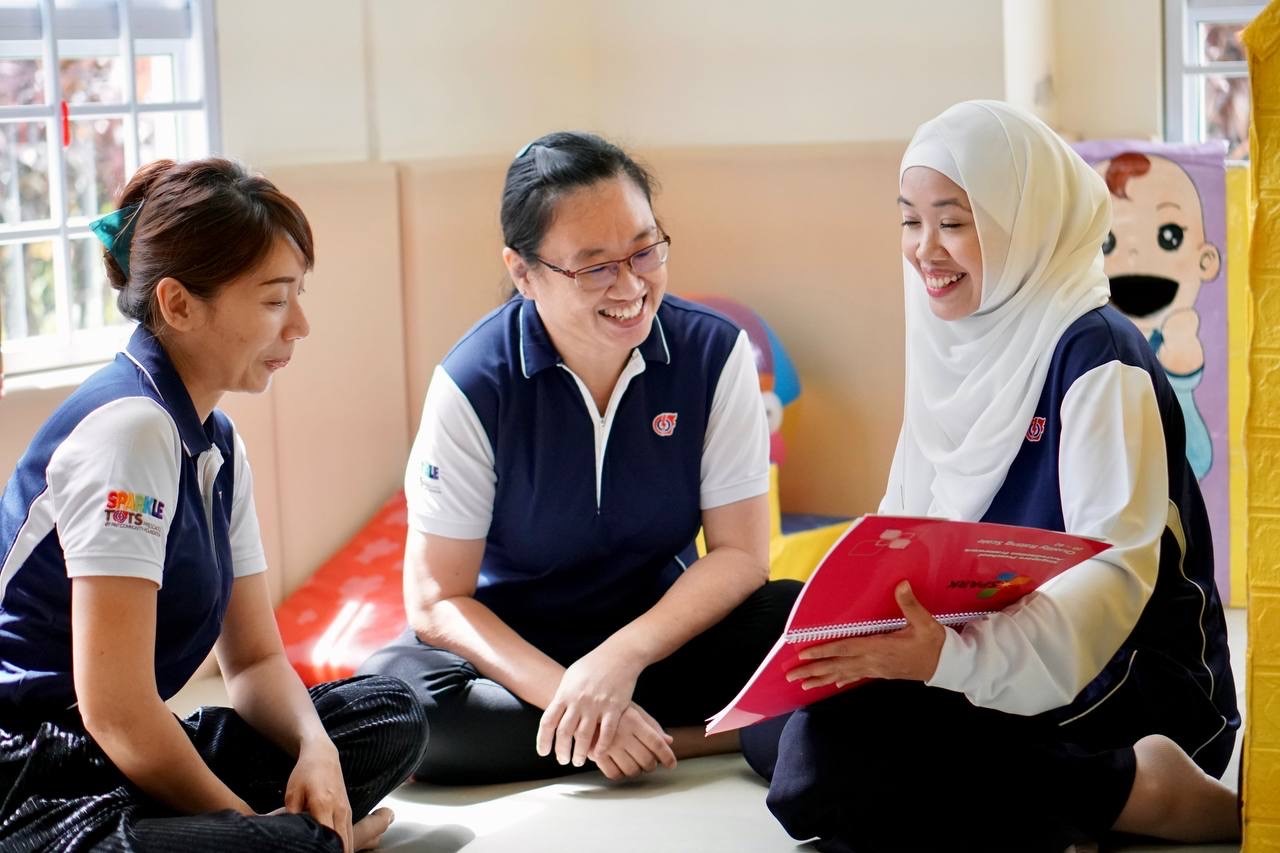
From Cabin to Classroom: Journey of an Outstanding Early Childhood Educator
The PDP modules allowed me to get creative with lesson ideas and keep up with the ever-changing Early Childhood sector.

Ms Farhana Binte Mohamed Hassan
Early Years Educator - PCF Sparkletots @ Pioneer Block 987D (CC)
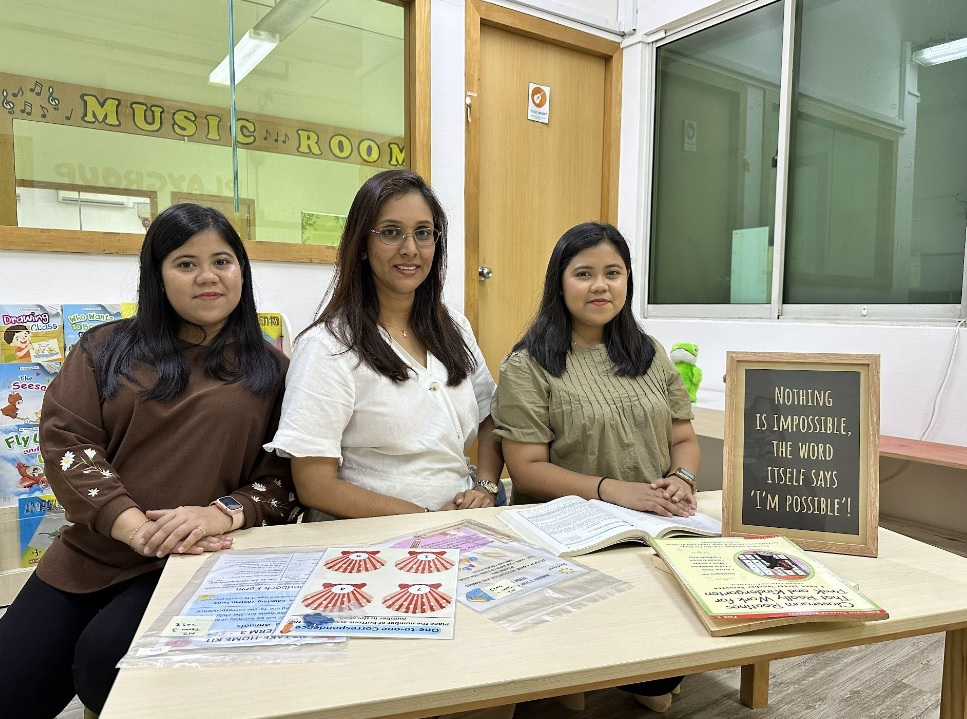
Translating Passion to Profession: Angelene, Nurziana and Sharidah's Voyage in Early Childhood Education
PDP has undoubtedly deepened the skill sets and enriched the expertise of exemplary educators such as (Nur)Ziana and Sharidah

Ms Jegatheswary
Cluster Head at Sunflower Preschool
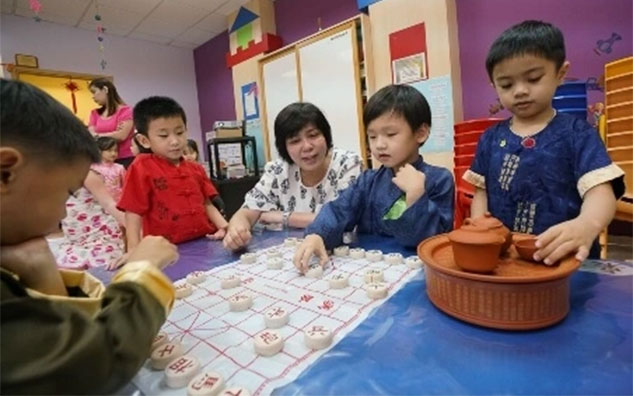
An Unwavering Passion
You need to have a passion for children, and I don’t mean just teaching them, but caring for them as well
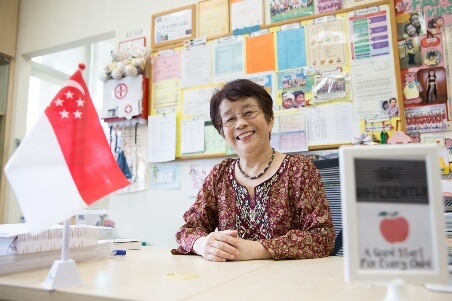
Mrs Elsie Yee
Principal - Faith Kindergarten